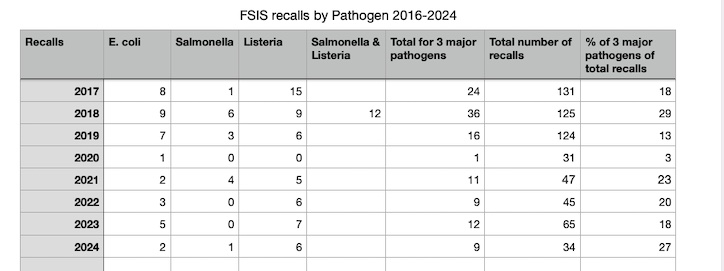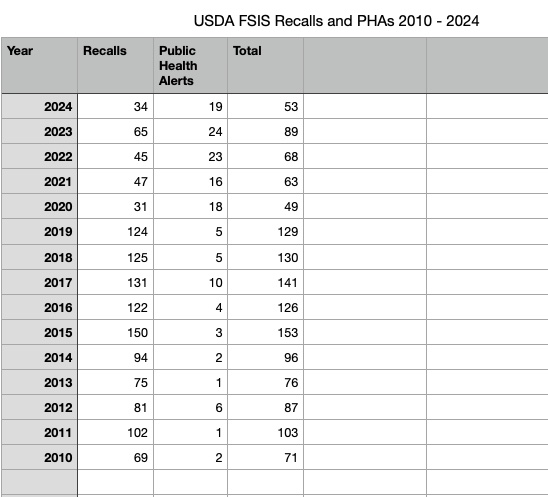In-depth analysis from Food Poisoning Bulletin
Meat and poultry producers issued 34 recalls last year, a 48 percent drop from 2023 and the lowest total of the last decade, excluding 2020, according to a Food Poisoning Bulletin review of data published by the U.S. Department of Agriculture’s Food Safety and Inspection Service (USDA FSIS).
“The number of recalls is likely to fluctuate over any given period of time, due to the number of variables that affect whether a recall is necessary to remove adulterated or misbranded product from commerce. Over the last few years, FSIS has pushed for more accountability from industry to produce safe and wholesome products. Through numerous calls, meetings, roundtables and guidance documents, we are proactively engaging with industry on ways to reduce products that must be recalled and we are seeing the results of these efforts,” Jackson Collier, a USDA FSIS public affairs specialist, told Food Poisoning Bulletin.
“Industry is acting faster on potential situations that may result in adulteration of products, in some instances using electronic means to control and hold products in their distribution chain to prevent them from reaching the consumers. FSIS reviews the actions of the firms and assesses each situation on a case-by-case basis. If FSIS finds that the products are not under control and they are available for sale, then the agency requests the firm to recall the product,” he said.
Recalls Linked to Pathogens
Nine recalls were issued for bacterial contamination. Of these, six were for Listeria, two were for E. coli, and one was for Salmonella. In four of these cases, the problem was discovered by a state agency, four more were through routine testing by USDA FSIS, and one was tied to a company’s tests.
Four recalls were linked to food poisoning outbreaks.

Public Health Alerts
USDA FSIS issues Public Health Alerts (PHAs) to notify the public about a problem with a meat or poultry product when it has decided not to request a recall from a company. Most often, this happens when the product is no longer for sale and, unfortunately, consumers have likely eaten the tainted food.
Although PHAs have the same information as recalls, they don’t carry the same weight. Consumers aren’t as likely to hear about them because companies aren’t required to contact customers, retailers generally don’t post them in stores or on their websites, and the media doesn’t pay much attention to them.
In recent years, PHAs have become more common. Before the pandemic, the 10-year annual average for these notifications was about four, now it’s 20. In 2024, USDA FSIS issued 19 PHAs, five fewer than in 2023.

Reasons for Recalls
Misbranding and undeclared allergens continued to be the top reason for a recall in 2024, followed by bacterial contamination, lack of inspection, foreign matter, import violation, and ingredients or processes that render food unfit for human consumption.
Recalls Linked to Outbreaks
Four recalls were linked to outbreaks in 2024.
Yu Shang Listeria Outbreak
A deadly Listeria outbreak linked to Yu Shang brand ready-to-eat products sickened 19 people in eight states. Seventeen people were hospitalized and two families suffered the loss of their infants.
Wolverine Ground Beef/Red Cow E. coli Outbreak
An E. coli outbreak linked to ground beef produced by Wolverine Packing Company of Detroit sickened at least 15 people. The tainted ground beef was served at Hen House and Red Cow locations in Minnesota and restaurants in Michigan, Massachusetts, Ohio, and Missouri.

Fratelli Beretta
A Salmonella outbreak linked to Busseto brand charcuterie platters sold at Sam’s Club, Costco, and other stores sickened 104 people, 27 of whom were hospitalized. On February 13, Fratelli Beretta of Mount Olive, NJ recalled all of its products containing coppa.
This is not the first time Fratelli Beretta’s charcuterie has been linked to an outbreak. In 2021, the company recalled 431 tons of uncured antipasto trays containing prosciutto, soppressata, Milano salami, and coppa after they were linked to a 17-state Salmonella outbreak.
Boar’s Head
 A 19-state Listeria outbreak linked to Boar’s Head liverwurst and other deli-sliced meat ended after sickening 61 people killing 10 of them.
A 19-state Listeria outbreak linked to Boar’s Head liverwurst and other deli-sliced meat ended after sickening 61 people killing 10 of them.
The filthy conditions at the company’s plant in Jarratt, VA triggered a law enforcement probe and outrage from members of Congress including Representative Rosa DeLauro (D-CT) and Senator Richard Blumenthal (D-CT) who urged USDA Secretary Thomas Vilsack and Attorney General Merrick Garland to explore possible criminal charges for Boar’s Head officials.
On July 26, Boar’s Head recalled some deli meats sold at grocery stores nationwide after a link to the outbreak was established. One week later, the company issued a 7-million-pound recall expansion that included all of the meat produced at the Jarratt facility which has since been permanently closed.
Boar’s Head Horror Prompts USDA to Review Its Inspection Model
Inspectors Found Insects, Mold, Pools of Blood
Inspectors working on behalf of USDA FSIS found dozens of food safety violations at the Boar’s Head plant in Jarratt months before the outbreak occurred, according to documents obtained by CBS News through a Freedom of Information Act (FOIA) request.
CBS obtained one year of monthly inspection reports from August 1, 2023, to August 2, 2024. During that period, inspectors visited the plant 58 times and found at least one violation each time yet no enforcement actions were taken.
The violations included: animal blood pooling on the floor, meat so old it had turned gray that was caked onto machinery, foul odors in cooler and other areas of the facility, dead and live insects, water dripping from the ceiling, standing pools of water some with algae, a black mold-like substance on the walls, rusty equipment, and doors, walls, and ceilings in a state of disrepair.
In the months since these reports were made public, no explanation has been offered as to why violations weren’t issued. The inspectors were from the Virginia Department of Agriculture and Consumer Services (VDACS) tapped to provide federal inspections for USDA FSIS under the Talmadge-Aiken Cooperative Inspection Program.
Virginia is one of 29 states that conducts meat and poultry inspections on behalf of USDA FSIS. Other states operating under this agreement are: Alabama, Arizona, Arkansas, Delaware, Georgia, Illinois, Indiana, Iowa, Kansas, Louisiana, Maine, Minnesota, Mississippi, Missouri, Montana, North Carolina, North Dakota, Ohio, Oklahoma, Oregon, South Carolina, South Dakota, Texas, Utah, Vermont, Virginia, West Virginia, Wisconsin, and Wyoming.
After the regulatory failure in Jarratt, USDA FSIS said it is reviewing the inspection model to prevent future oversight gaps.
“Ten people died in this outbreak,” said noted Food Safety Attorney and Food Poisoning Bulletin Publisher Eric Hageman. “Any improvement to the inspection system that can make the food we eat safer is welcome and overdue.”





